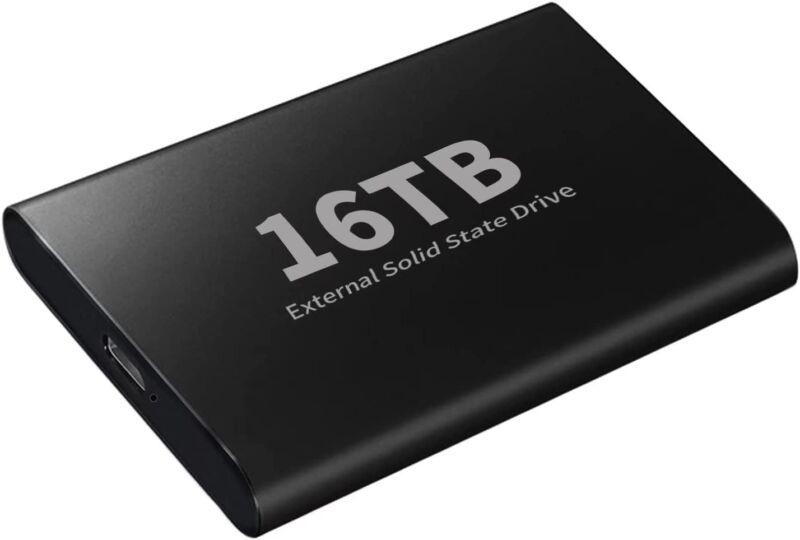
Amazon won’t deny that fraudulent reviews on its platform are a problem. And despite years of reports of fake storage products, listed with falsified reviews to cover up fake specs and performance claims, the scams keep coming.
On Monday, Review Geek detailed its purchase of what an Amazon listing claimed was a 16TB portable M.2 SSD for $70. The drive, like similar Amazon listings, had dozens of five-star reviews. Yet, the cheap SSD turned out to just be a 64GB microSD in a circuit board with a USB-C connector.
This is all despite the drive showing as 16TB storage on Windows, which Review Geek suspects is due to deceptive circuit board firmware.
The listing and box weren’t even honest about its connectivity, claiming USB 3.0 Micro B to USB 3.1 Type-C. The device really relies on USB 2.0, Review Geek determined after testing the product with ChipGenius, an app for examining USB devices. Moving 1GB of data with the SSD microSD card reportedly took 20 minutes instead of the expected single minute.
Finally, the box’s claims of compatibility with smart TVs, Android, Windows 7, and Windows 10 remain questionable, and support for “| OS” seems impossible since that’s not a thing.
The good news is Review Geek didn’t find any malware on the device.
The bad news is that this is just one example of the countless that have been reported over the past few years and remain scattered across Amazon.
Cheap “16TB SSDs” abound
After reading Review Geek’s story, I searched Amazon for a “16TB SSD,” and was immediately met with $70-$110 options with unknown brand names, like Generic, SAJIULAS, and WIOTA, the brand of the drive Review Geek purchased. All had at least 3.5 stars, and some had hundreds of reviews.
However, reading some of these reviews made me question if we’ve been using SSDs wrong all this time. A review on one of the remarkably cheap portable SSD listings declared the product to be “a very colorful throw, but thinner” than expected. Another reported that the drive proved “very soft and perfect” for their 6-year-old. One review pointed to the SSD being a “beautiful portrait” that looks great in the kitchen, while another five-star review pointed to the high microphone and video quality.
I even saw a review hinting at one of the portable SSD’s true nature, stating that it’s an “affordable 64GB” option, despite the review appearing under a 16TB SSD.
As pointed out by Review Geek, scammers have been editing existing listings (including new pictures, titles, and descriptions) for a product until they are selling a completely different item. That way, sellers can maintain the high reviews, and make the new product look highly rated. This also explains how portable storage could get five stars for being great to look at while eating dinner.
Whether you call it review merging, review reuse, or review hijacking, it’s a practice scammers have used to mislead PC component shoppers for years and one Amazon has yet to eradicate.
History repeats itself
Unfortunately, tales of basic microSD cards posing as high-speed, high-capacity portable SSDs have been picking up steam lately. ZDNet reported on buying a $20 example in May, and TechRadar discussed the issue in September, noting the takedown of some Amazon listings after its article. In August, we reported on a scammer selling a 30TB portable SSD on Walmart for $39.
Regarding PC storage in general, there are countless reports of people getting products different from what’s advertised on Amazon. And it’s not only limited to SSD storage. People have reported duplicitous postings for cheap hard disk drives and USB flash drives.
Review Geek’s story is a reminder of how careful shoppers must be when buying suspiciously cheap tech from websites. Despite reports and subsequent removals of fraudulent storage devices, they keep popping up.
According to Review Geek, the product it purchased disappeared and was immediately replaced by another listing before Review Geek reported the fraud to Amazon. It’s unclear if Amazon removed the original posting or if the seller did it independently before it could be penalized.
As Review Geek put it, it’s like a game of whack-a-mole for Amazon. Amazon’s review process has led to scrutiny from customers, the media, and UK’s competition regulator, The Competition and Markets Authority. Amazon has turned to the courts to combat companies and Facebook groups that it alleges sell fake reviews. Amazon has been suing over fake reviews since 2015. but they still run rampant on the site.
